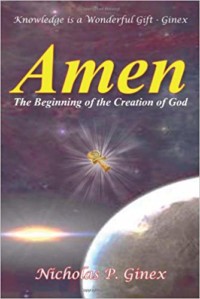Title: Amen: The Beginning of the Creation of God
Author: Nicholas P. Ginex
Publisher: XlibrisUS
ISBN: 978-1-4771-1905-1
Genre: Religion/Spirituality
Reviewed by: CC Thomas
Pacific Book Review
In the forward of Nicholas P. Ginex’s Amen: The Beginning of the Creation of God, the author encourages the reader to look past previously conceived and taught religious ideologies, and consider a “new” idea; that all religions share similar theologies because they share a common ancestor.
Ginex starts testing readers’ beliefs right away within the first chapter, titled “Jesus Proclaims a Revelation.” In this chapter, Ginex traces the word “amen” back to ancient Egyptians and the pharaohs, long before the time of Jesus. The rest of the book is carefully laid out to explain further this claim, that the word “amen” is not a prayerful supplication to the one God of Christianity, Islam, Judaism, but instead, refers back to an ancient Egyptian god, Amen. While this might seem like heresy to some diehard religious fanatics, Ginex claims we look deeper at the word and more fully understand its historical relevance. Indeed, the entire book can be summed up in one sentence: What does “amen” really mean? Which leads to the real question for readers: What if Amen refers back to a common ancestor of all religions?
While such a claim deserves to have an audience, most will reject all the ideas brought up in the first chapter. Ginex is not a stranger to this statement and actually wrote a forward explaining negative reviews and outright rejections of his work. Therein lies the real shame. Most will not even listen to Ginex’s ideas because they reject what is core dogma in religion.
For those willing to keep an open mind, though, the claims are fascinating…and persuasive. The author carefully lays out his theory with meticulous research and data. A thorough bibliography is included, as are notations, photographs, and illustrations explaining the author’s hypothesis formations and development. From this reader’s perspective, the research backed each claim and hypothesis thoroughly. While the book and research might not pass strict academic standards, it leaves the reader in wonder. After all, what if…It is not an exaggeration to say that this book is an important read. By accepting the ideas, or at least accepting the What ifs, readers can come to understand that the commonalities between all religions can bring a peace to the world, one which is sorely missing. At the very least, Amen will give you pause to think. Embrace that pause and know that questioning theology doesn’t cause a loss of faith. Instead, it can create a strength as followers in a religion can come to better understand why the ideas of their own beliefs are important. Beside the importance of the topic, it’s also a solidly good read, one full of interesting historical facts that weaves together a premise that has the potential to do a lot of good in the world.


